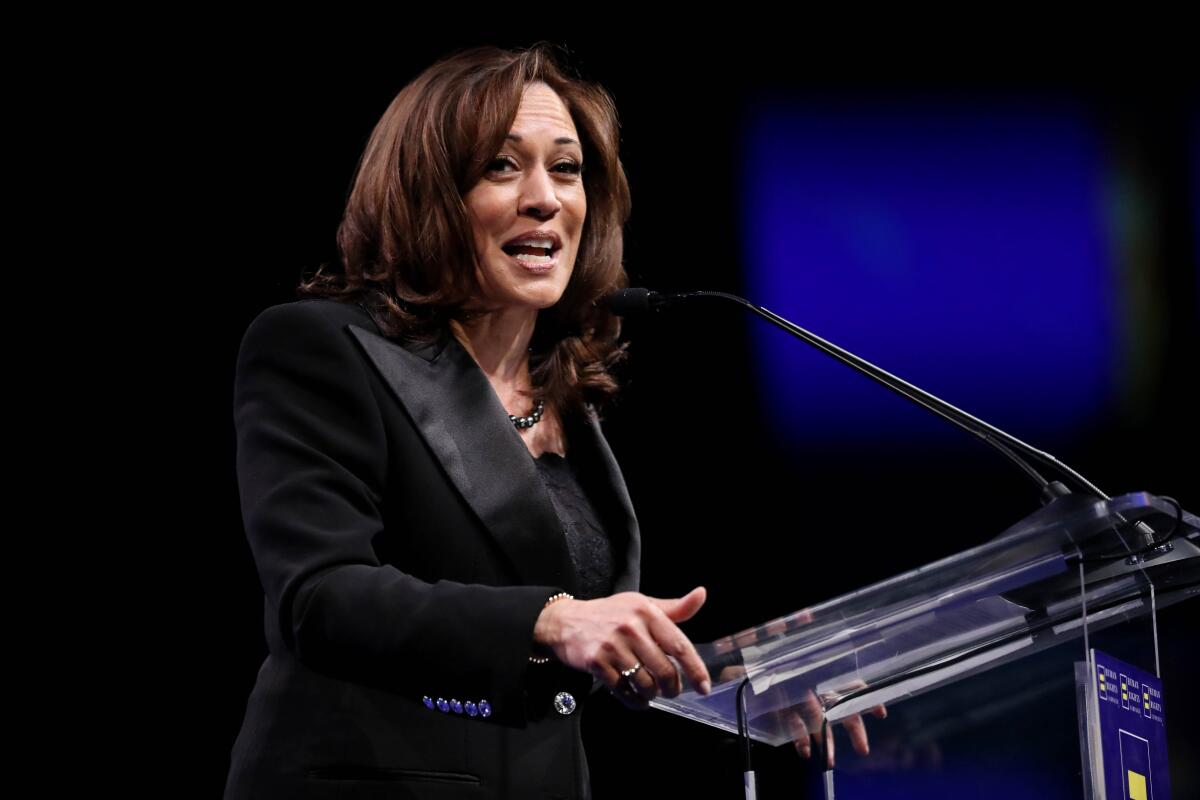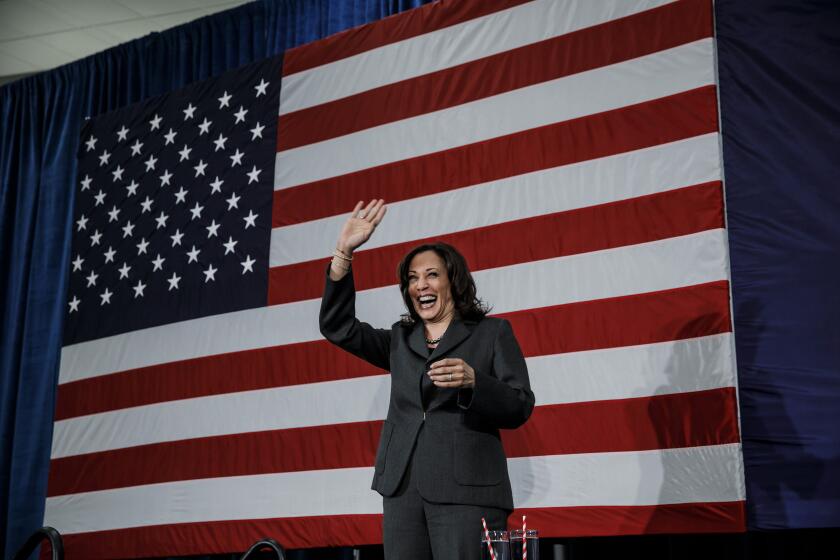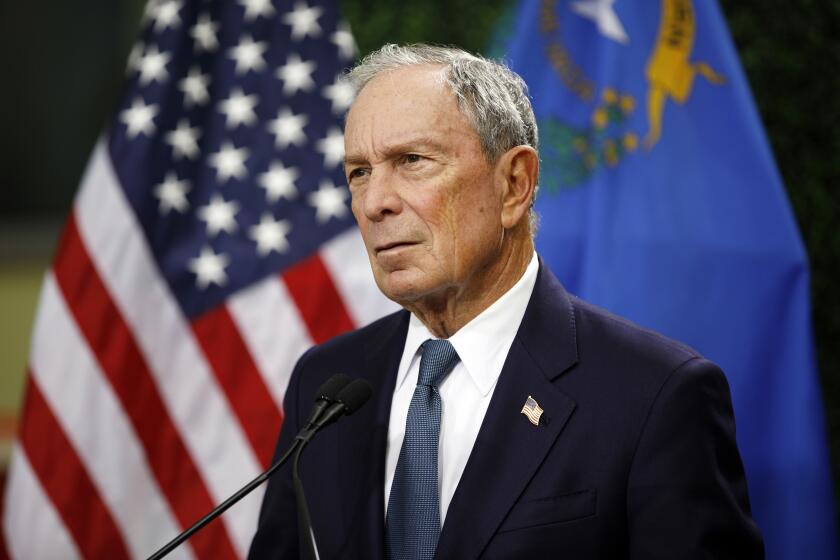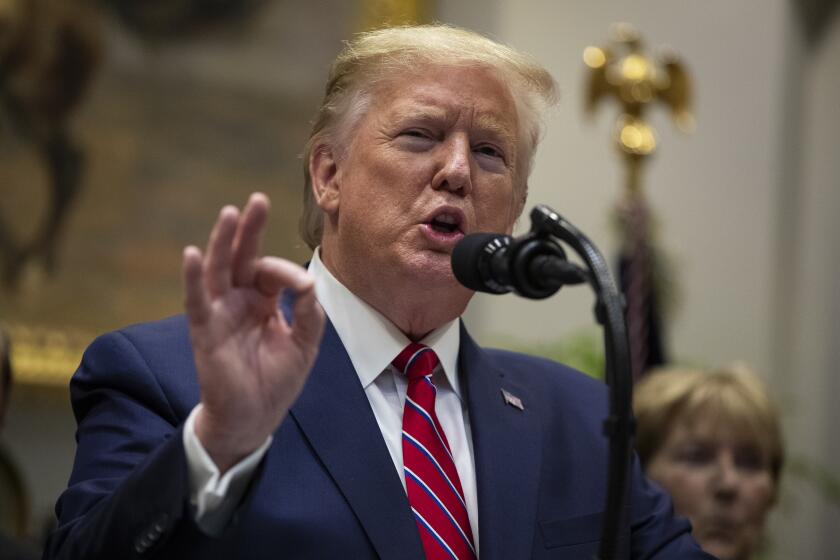California’s presidential primary is wide open — but not because Kamala Harris dropped out

- Share via
SACRAMENTO — The winner of the Democratic presidential primary in California will likely be decided in Iowa, New Hampshire and South Carolina.
Maybe throw in Nevada as a California decider too.
That’s how human nature behaves, and therefore so does American politics.
Those other states will vote first, starting with pampered pipsqueaks Iowa and New Hampshire. They always get all the fun choosing presidential front-runners.
It’s human to want to be on the side of a winner. That’s why we root for sports teams, our spirits soaring when the squad triumphs, but in the dumpster when it loses.
And in politics, we really don’t like to waste our vote on a sorry loser.
California will hold its primary election to award convention delegates to presidential candidates on March 3. That’s so-called Super Tuesday, the closest thing we have to a national primary. There’ll be 16 contests in far-flung states and territories, with the largest by far in California.
Californians can start mailing in their ballots a month ahead on Feb. 3, the same day Iowans caucus. New Hampshire votes eight days later, and then Nevada and South Carolina.
After being elected to the Senate in a 2016 cakewalk, Sen. Kamala Harris should have spent the next three years focused exclusively on representing Californians in Congress, helping the state on such vital issues as water development, environmental protection, healthcare and homelessness.
It’s a good bet that California Democrats won’t be rushing to fill out their mail ballots. They’ll be sizing up how the candidates are faring elsewhere and trying to get behind someone who has a good crack at winning the nomination and ousting President Trump.
“California voters are going to sit back and see what happens in other states,” veteran Democratic consultant Garry South predicts. “They’re not going to throw their vote away on someone who’s going to come in seventh or eighth. The notion they’re going to mail in a ballot on Feb. 3 is idiotic.”
Still, California frequently does not side with the eventual nominee, voting instead as a maverick state.
“We’ve had some contrarian primaries here,” Democratic strategist Bill Carrick notes. “There definitely is a bandwagon effect, but it’s not a cut and dried thing.”
Examples: Hillary Clinton beat Barack Obama by 8 percentage points in the February 2008 California primary, but Obama was ultimately nominated. In 1980, Massachusetts Sen. Edward M. Kennedy embarrassed President Carter with a 7-point victory in the June primary, but Carter was re-nominated.
Conventional wisdom says the billionaire ex-mayor can’t possibly win the Democratic nomination. But political wisdom has become pretty shaky in recent years.
So any speculation — and there’s lots of it — about which candidate will benefit most from California Sen. Kamala Harris dropping out of the race last week isn’t worth much.
For starters, Harris didn’t have very many anticipated California votes for another candidate to reap.
Just before waving the white flag, she was down to 7% in late November polling by the UC Berkeley Institute of Governmental Studies. An early November survey by the Public Policy Institute of California showed Harris at 8%.
Leading the Berkeley IGS poll were Vermont Sen. Bernie Sanders with 24% and Massachusetts Sen. Elizabeth Warren at 22%. Then came former Vice President Joe Biden, 14%, and South Bend, Ind., Mayor Pete Buttigieg, 12%.
Based on participants’ second choices, the poll indicated that Warren and Biden would capture the largest share of Harris’ meager support. But, again, it’s likely that many Californians won’t decide whom to vote for until they see how candidates run in earlier races.
Former New York City Mayor Michael R. Bloomberg won’t be tested in the four early contests, at least directly. He isn’t putting himself on ballots until Super Tuesday. Regardless, his fate also will largely be determined by those early states. If a candidate or two catches fire, Bloomberg might as well give up. But if top-tier candidates falter — especially Biden — an opportunity will open for the New Yorker.
A new poll from the Public Policy Institute of California shows 55% of likely voters said their main interest was ousting President Trump. Only 36% preferred a nominee who they mostly agreed with on issues.
Harris had been bestowed with endorsements from establishment Democrats in California, led by Gov. Gavin Newsom. Many who endorsed her felt an obligation to be a team player with the state political power structure. Now they’re free to endorse anyone they wish.
Newsom was swamped with phone calls from candidates and their surrogates immediately after Harris bowed out. The buzzards have been zeroing in on stranded Harris supporters.
The governor is not inclined to endorse anyone else, at least for now. But as the primary gets closer, pressure will mount on him to give some candidate a boost.
“There’s nothing worse than every day having to answer the same question about ‘are you going to get involved?’” says Carrick, longtime chief strategist for Democratic Sen. Dianne Feinstein of California. “It doesn’t look like you’re exercising leadership. And the pressure is so much greater now because of Trump” and the Democrats’ passion to oust him.
But generally, endorsements aren’t worth much unless they result in significant grass-roots volunteer work or are written on the back of a check. Harris had a large cadre of California contributors and fundraisers who now are being recruited by other candidates.
“Those people are up for grabs,” says South, who was chief strategist for former Gov. Gray Davis, a fundraising glutton. “They can go where they want now without being viewed as traitors” to Harris.
But, South adds: “California’s big donors are pretty independent. They play the field. Many have multiple candidates they give to for the same office. They’re very discriminating. They don’t need recommendations from others.”
The California race is wide open, but not because Harris got out. It’s because no other states have voted yet.
More to Read
Sign up for Essential California
The most important California stories and recommendations in your inbox every morning.
You may occasionally receive promotional content from the Los Angeles Times.

















